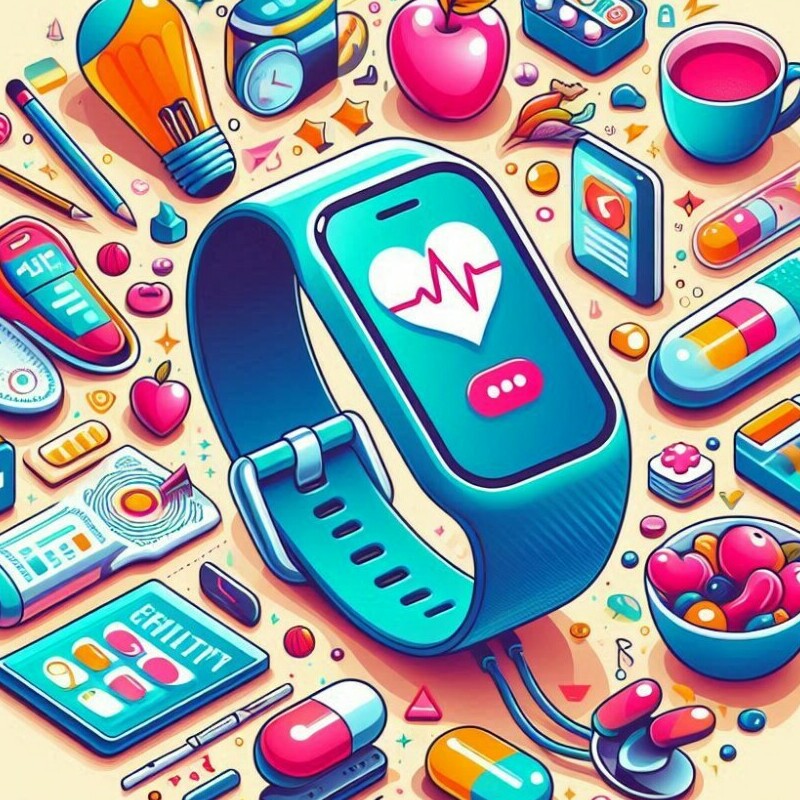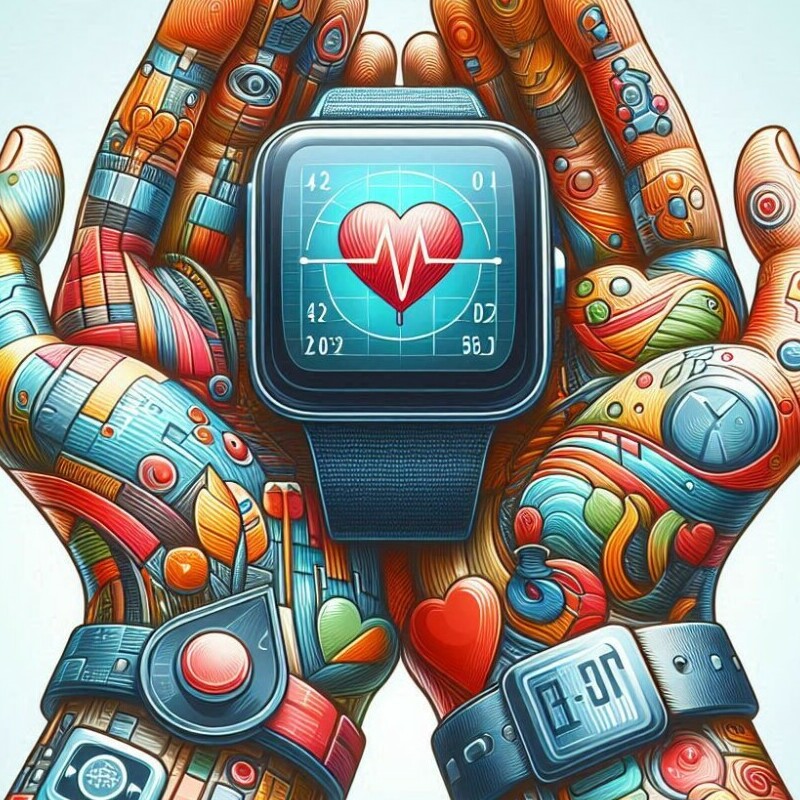
In today’s fast-paced world, wearable health technology has revolutionized the way we monitor and manage our well-being.
The expansive realm of wearable health tech is a field that’s not just hitting its stride but sprinting forward at an impressive pace. Wearable tech has woven itself into the fabric of our daily lives, so much so that it’s becoming a staple for those invested in their well-being.
This isn’t just about strapping on a fitness tracker; it’s also about the intricate dance between technology and health management. From smartwatches that monitor heart rates to sleep trackers that delve into the mysteries of your slumber, these devices collect valuable health data that was once only accessible in a doctor’s office.
In my opinion, the real magic lies in the tiny sensors and sophisticated algorithms that paint a detailed picture of your health. They track everything, from your steps to your stress levels, and give you actionable insights. It’s like having a personal health coach on your wrist, one that’s always keeping an eye out for you.
I’m here to help you navigate through this diverse landscape of gadgets. We’ll look at various types of wearable technology that cater to different aspects of health. Whether it’s monitoring chronic conditions or helping you achieve your fitness goals, there’s something out there for everyone.
Don’t worry too much about feeling overwhelmed by the options. I’ll arm you with the knowledge you need to make sense of all the metrics and terms. By the end of this guide, choosing the right wearable should feel less like a shot in the dark and more like a well-informed decision you can feel confident about.
Leading the Charge: Top Wearable Health Technologies

When it comes to wearable health technology, there’s a lot to keep up with. The landscape is constantly evolving, and consumers have a wide array like never before. But I’m here to help you navigate that landscape. The top wearable health technologies stand out for their innovative features, user-friendly designs, and, most importantly, their accuracy and reliability in monitoring health metrics.
You’re going to find out about smartwatches and fitness trackers that track everything from your heart rate to your sleep patterns. But that’s not all. There are also specialized wearables that monitor blood glucose levels without needing a prick of the finger and devices specifically tailored for women’s health, tracking menstrual cycles and related symptoms.
Features that set apart high-quality devices include long battery life, comprehensive health analytics, seamless integration with smartphones, and robust data protection. Market leaders are taking these features even further with waterproof designs, solar charging capabilities, and the use of Artificial Intelligence to provide personalized health insights.
Your first introduction to these devices might come from big names like Apple, Samsung, Garmin, Fitbit, Xiaomi, Huawei, Ulefone, and Prixton, but there’s a whole world of specialized brands that cater to niche health needs. In the following segment, I’ll be taking you through some of the cutting-edge technologies that are making a mark in the industry and how they compare with the tried-and-tested leaders of the pack.
Innovations on the Horizon: The Latest Advancements in Wearable Health Tech
I’m going to take you through the exciting world of emerging wearable health technologies. It’s not just about step counters and heart rate monitors anymore; it’s also about cutting-edge devices that promise to revolutionize personal healthcare.
You’re going to find out about the recent advancements that are setting the stage for a future where wearable tech plays a central role in monitoring and managing health. Think biosensors that can detect diseases early, smart tattoos that monitor your glucose levels, and even clothes that gather your biometric data.
Now, let’s explore the potential of the latest wearable health monitoring devices. With new players entering the market, it’s fascinating to see how innovations focus on specialty areas, like stress reduction and sleep enhancement, or cater to specific conditions, like arrhythmias or chronic pain.
The shining examples of these new technologies aren’t just gadgets; they represent new opportunities for proactive health management. You’ll learn about devices that sync with your smartphone to provide real-time insights and others that offer predictions to help you prevent illnesses before they occur.
By the end of this section, you should feel informed about the advances in wearable health technology. This isn’t just a peek into the future; it’s a guide to understanding how these innovations could potentially improve your life.
Making an Informed Choice: Reviews and Rankings of Wearable Health Devices

I’m sure by now you’ve got a sense of the exciting developments in wearable health technology. But with so many options, you might be asking, ‘How do I choose the right one?’ That’s where reviews and rankings come into play.
By diving into reviews, you’re going to find out about real-world performance and reliability. It’s one thing to read about features; it’s another to hear about them from users who’ve put these devices to the test. I’m talking about battery life, user-friendliness, accuracy, and even customer support.
Now, there are standouts in the world of wearable health monitoring devices, and they’ve earned their place at the top for a reason. They’ve been vetted by users and experts alike, building trust and credibility.
In my opinion, the best way to navigate reviews is to look for patterns. If multiple sources complain about the same issue, that’s a red flag. Conversely, if a feature is consistently praised, it’s probably a solid bet.
You might be tempted to zero in on the top-rated wearable, but I encourage you to consider your individual needs. A device that’s fantastic for one person might be overkill for another. Choose something that resonates with you.
So, before you make a decision, take your time. Read the reviews, weigh the pros and cons, and think about how each device fits into your life. When you find a match, that’s when you’ll understand the true value of wearable health technology.
Remember, your first attempt at selecting a wearable doesn’t need to be your last. You can always adjust your approach down the road as new information comes to light.
I hope that this guide serves as your springboard into the vast sea of wearable health technology. It’s an investment in your health, and by making an informed choice, you’re setting yourself up for success. Thanks for wandering through this world with me, and remember, stay informed, stay healthy, and leverage the technology that’s right for you.
By integrating advanced sensors, AI capabilities, and user-friendly interfaces, the best wearable health technologies are transforming the way we approach wellness. Embracing these innovations can lead to more proactive health management, ultimately enhancing our quality of life. Stay ahead of the curve by exploring the latest in wearable health technology, and take a step towards a healthier, more informed you.
Kindly leave your comments and experiences below.
Are You a Wealthy Affiliate Yet? Affiliate Marketing Success.
Simplified. Turn YOUR Passion, Hobby or Interest into YOUR Success Story! Join Wealthy Affiliate today: https://www.
**Here’s a little transparency: Our website contains affiliate links. We may receive a small commission if you click and make a purchase. Don’t worry, as there’s no extra cost to you. It’s a simple way to support our mission of bringing you quality content.
Follow me on social media!

The passage offers a comprehensive overview of the transformative impact wearable health technology has on our daily lives and well-being. The passage is well-written, engaging, and effectively conveys the significance of wearable health technology. It balances technical details with accessible language, making it suitable for a broad audience. The use of metaphors and relatable comparisons helps to paint a vivid picture of how wearable health technology functions and its potential impact on individual well-being.
Here are some questions based on the article about wearable health technology:
1. What is wearable health technology and how has it impacted the way we monitor and manage our well-being?
2. How do wearable devices provide actionable insights into one’s health?
3. Why does the author believe that the ‘real magic’ of wearable health technology lies in the sensors and algorithms?
4. What challenges or limitations might arise from the widespread use of wearable health technology?
5. How do you think wearable health technology will evolve in the next decade?
6. What are the potential benefits of having continuous health monitoring through wearable technology?
Hello Aparna,
I appreciate your contribution and insightful comment on the article.
The role that wearable health technology plays in modern lives in enhancing health and well-being is so enormous and transformative, as the article illustrates.
To address your questions:
Wearable health technology include devices like smartwatches and fitness trackers that monitor various health metrics, revolutionizing how we manage and understand our health.
These devices collect data on activities and biometrics, providing real-time insights and personalized health recommendations for individuals. They also make it easier for health care professionals and providers to monitor the health of some designated individuals and patients.
The real magic lies in the advanced sensors and algorithms that analyze collected data, turning such information into actionable and meaningful health insights.
Some of the apparent challenges of this wearable health technology include data privacy concerns, accuracy, the potential overdependence on such wearable health technology for health monitoring, etc.
Wearable technology is expected to become more integrated, accurate, and more personalized, possibly incorporating AI and bio-sensing capabilities.
Wearable health technology through continuous monitoring can lead to the early detection of some health issues, ensuring better health results.
Thank you for your comment and thoughtfulness.
All the best,
Makinde
Hi,
I am interested in specifically which products you would recommend from the Amazon link provided. What do they do and why do you recommend these? I am here because I want someone to have done some of the research for me and I want you to make recommendations. I feel like I don’t know enough about what options each brand and model includes, or why I would want a particular option. Any insight you can offer would be appreciated.
I am also interested in hearing more about wearable health technology that monitors specific conditions, such as glucose levels or hormonal changes during menstrual cycles.
Thanks,
Julie
Hello Julie,
I appreciate your contributions to the article.
Below are some of the product recommendations from the provided Amazon link:
Fitbit Charge 5: Features include tracking heart rate, sleep, stress levels, and built-in GPS.
Reason: It has a comprehensive health tracker with a friendly-user interface, making it great for monitoring multiple health metrics.
Omron Platinum Blood Pressure Monitor: Features include measuring blood pressure and storing data for two users.
Reason: It has accurate readings, is easy to use at home, and has multi-user capability.
KardiaMobile EKG Monitor: Features include the recording of medical-grade EKG; it detects atrial fibrillation, bradycardia, and tachycardia.
Reason: It integrates easily with smart phones, is portable, and is ideal for regular heart monitoring.
Wearable health technology includes:
Continuous Glucose Monitors (CGMs): Some of the products are:
Dexcom G6 features real-time glucose monitoring.
Reason: Provides continuous data, reduces the need for finger pricks, and offers comprehensive glucose trends.
Wearable hormone monitors, for example, include: Ava Bracelet; featuring menstrual cycle tracking, fertility and hormonal change tracking.
Reason: It offers insights into menstrual health, it helps manage symptoms and understand cycles better.
In answer to your questions, these recommendations should help you make informed decisions based on your needs.
Of course, contacting your health professionals remains the best in choice when it comes to serious health issues.
Thank you for your support.
Regards,
– Makinde